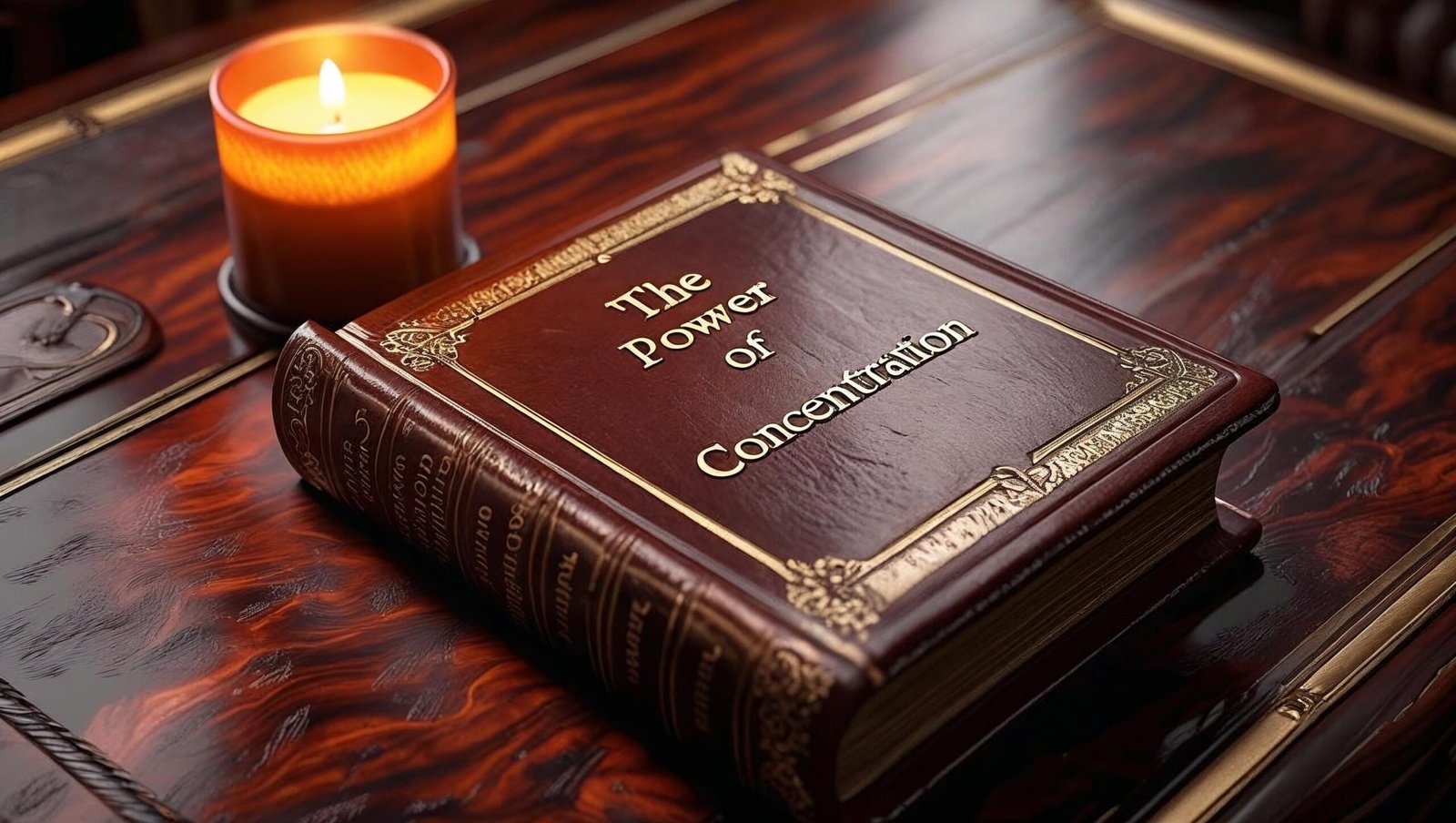1. Introduction to the Author and the Premise
The Power of Concentration by Theron Dumont is attributed to one of the pen names of William Walker Atkinson, a prolific figure in the New Thought movement. Under the guise of Theron Dumont, Atkinson addresses the quintessential faculty of success—concentration.
This book is not a casual read. Rather, it is an instructive manual, compelling the reader to introspect, reflect, and above all, act. From the outset, The Power of Concentration by Theron Dumont declares that mastery over the self is inseparable from mastery over concentration.

2. Concentration as the Key to Success
In the very first lessons, The Power of Concentration by Theron Dumont states emphatically that concentration is the foundation of achievement in any field. Be it business, academics, the arts, or athletics, focused mental energy distinguishes the ordinary from the extraordinary.
Dumont insists that success does not arise from scattered attention but from concentrated effort. He proposes daily practices that incrementally sharpen the mind, enabling one to direct it at will.
3. The Elimination of Mental Weakness
A crucial aspect explored in The Power of Concentration by Theron Dumont is the identification and eradication of mental weakness. The author classifies fear, doubt, procrastination, and emotional instability as enemies of focus.
Dumont provides powerful affirmations and visualisation exercises to rewire the subconscious. He asserts that one cannot cultivate concentration while harbouring self-limiting beliefs. The book is thus as much about inner transformation as it is about mental discipline.
4. Training the Willpower
Another significant takeaway from The Power of Concentration by Theron Dumont is the relationship between concentration and willpower. Dumont posits that the will is like a muscle—it strengthens with deliberate use.
He encourages readers to perform simple tasks—such as maintaining a steady gaze on a candle flame or repeating a word silently for five minutes—daily. These seemingly mundane activities are actually potent tools for developing inner control.
5. Concentration and Physical Health
In a unique turn, The Power of Concentration by Theron Dumont links physical health with mental concentration. Dumont argues that a scattered mind often reflects a disordered body, and vice versa.
He recommends moderation in eating, regular physical activity, deep breathing exercises, and proper posture. The book thus lays out a holistic vision of health wherein body and mind support one another toward the goal of focused living.

6. Business Applications of Concentration
Perhaps one of the most pragmatic sections of The Power of Concentration by Theron Dumont pertains to business and professional success. Dumont illustrates how executives, salesmen, and entrepreneurs can increase productivity and earnings through mental control.
He emphasizes the importance of present-moment awareness, decisiveness, and detachment from emotional turmoil. By concentrating on one’s task fully and systematically, even difficult business challenges become solvable.
7. The Art of Silent Power
One of the most compelling chapters in The Power of Concentration by Theron Dumont discusses the “silent power” of the focused mind. Dumont contends that individuals who cultivate inner stillness and clarity develop an invisible aura of authority.
This silent power, according to him, radiates self-confidence and inspires respect without the need for noise or display. The concept closely resembles modern notions of mindfulness, yet it is couched in the dignified language of self-command.
8. Breaking the Chains of Habit
The Power of Concentration by Theron Dumont identifies poor habits as obstacles to a focused life. Dumont’s counsel is neither moralistic nor sentimental. He is clinical and practical—habits are merely patterns, and they can be changed with concentrated effort.
He encourages the use of visualisation, repetition, and affirmative declarations to gradually overwrite old tendencies. Dumont teaches that the mind, if persistently directed, can be moulded like clay.
9. Concentration and Happiness
Not many would link concentration with happiness, but The Power of Concentration by Theron Dumont does so masterfully. Dumont explains that a concentrated mind is a peaceful mind. It does not fret over past errors or future anxieties.
Through focus, one begins to live in the present moment, deriving deeper satisfaction from simple experiences. Thus, concentration not only makes one efficient but also brings joy and serenity.

10. Practical Exercises to Cultivate Concentration
Throughout The Power of Concentration by Theron Dumont, the author introduces practical exercises to develop this mental faculty. Some notable practices include:
-
Fixing attention on an object for 10 minutes without distraction.
-
Writing with the non-dominant hand to build neural resilience.
-
Daily affirmations, such as “I am the master of my mind and focus.”
-
Concentration walks, where one remains intensely aware of steps, breath, and surroundings.
These techniques, though simple, are remarkably effective if practiced consistently.
Timeless Wisdom in a Modern World
Despite being over a century old, The Power of Concentration by Theron Dumont reads like a spiritual guidebook for our technology-saturated world. Its ideas are stark yet potent, traditional yet prescient.
In the modern era where social media, entertainment, and multitasking erode mental stamina, Dumont’s work stands as a timeless antidote. The reader emerges not just informed, but transformed.
Advanced Insights: Going Deeper into The Power of Concentration by Theron Dumont
While the foundational lessons in The Power of Concentration by Theron Dumont offer a structured path toward mental mastery, the deeper implications of this book reveal a spiritual and philosophical undercurrent that elevates it beyond a mere self-help guide.
Dumont was writing in an era where psychology was just beginning to explore the connection between consciousness and success. Yet, with remarkable foresight, he laid out principles that now form the bedrock of many cognitive training, mindfulness, and behavioral coaching programs.
Let us now explore the nuanced dimensions of the book that may not immediately meet the eye, but are deeply transformative when understood and applied.
The Subtle Energies of Thought
One of the more esoteric claims made in The Power of Concentration by Theron Dumont is that thought possesses energy—subtle yet powerful. Dumont suggests that concentrated thought can influence not only one’s own behavior but also impact people and situations in subtle ways.
Modern neuroscience, while cautious in its approach, now acknowledges the power of sustained thought to rewire neural pathways—a concept Dumont intuitively grasped over a century ago.
He writes with conviction that individuals who learn to hold a single thought, image, or intention unwaveringly in mind can manifest results that seem “miraculous” to the untrained eye. This principle forms the silent core of manifestation and intention-setting practices widely adopted in personal development circles today.
Mental Magnetism and Personal Aura
A particularly intriguing concept in The Power of Concentration by Theron Dumont is that of mental magnetism. Dumont proposes that individuals with concentrated minds develop a personal aura—an invisible magnetic field that draws others to them.
This magnetic power, according to Dumont, is not mystical but a natural extension of inner coherence and mental discipline. When one is inwardly aligned, free of distraction, and rooted in clarity, they radiate strength, stability, and influence.
While the language may sound archaic, the idea resonates with contemporary understandings of charisma, presence, and energetic resonance. Leaders, mentors, and speakers who captivate their audiences invariably exhibit this invisible force born of focused attention.

Concentration in Communication
The Power of Concentration by Theron Dumont does not merely teach inward focus—it teaches the application of that focus in real-world interactions. Dumont urges readers to listen deeply, speak deliberately, and express ideas with precision.
He claims that individuals who learn to concentrate during conversation are far more persuasive, impactful, and memorable. This advice is corroborated today by communication experts who emphasize “active listening” and “presence” as keys to connection and persuasion.
Moreover, Dumont encourages reducing meaningless chatter. A concentrated mind does not waste energy in idle speech. Instead, it engages with purpose, lifting the quality of every interaction.
Concentration and Emotional Mastery
In one of the more spiritually rich sections of The Power of Concentration by Theron Dumont, the author explores how concentration empowers individuals to master their emotions. Anger, fear, jealousy, and even despair, he writes, can be transformed when one learns to place conscious attention on their inner states.
The ability to observe emotion without impulsively reacting to it is a form of mental alchemy. This lesson parallels teachings from Eastern disciplines like Zen Buddhism and Stoicism, both of which emphasize detachment, stillness, and deliberate thought.
The concentrated individual does not become robotic or indifferent. On the contrary, they become more alive, more discerning, and more attuned—able to respond rather than react.
Overcoming the Noise of the World
Modern civilization—with its unending notifications, media overload, and fragmented attention—is perhaps the greatest challenge to mental clarity. In this context, The Power of Concentration by Theron Dumont becomes more than a book. It becomes a shield.
Dumont anticipated the rise of mental clutter. He advises readers to create pockets of silence, to guard their attention as they would guard a treasure, and to retreat periodically into solitude for introspection and mental regeneration.
The reader who heeds this advice finds themselves more resilient in a world that profits from distraction. They become self-possessed, immune to trends, and able to forge their own path with intention.
Case Studies and Modern Parallels
Let us consider how the core ideas of The Power of Concentration by Theron Dumont manifest in contemporary success stories.
-
Steve Jobs, known for his minimalist lifestyle and laser-sharp focus, cultivated Zen-like concentration. His ability to filter noise and zoom in on what truly mattered was central to Apple’s revolutionary products.
-
J.K. Rowling, while writing the Harry Potter series, often isolated herself from the world to concentrate fully on her craft—an example of Dumont’s insistence on the solitude necessary for creative excellence.
-
Michael Jordan and other elite athletes frequently speak of “the zone”—a state of heightened concentration where time slows down and peak performance flows naturally. This directly mirrors Dumont’s portrayal of focused living.
These figures exemplify the philosophy that The Power of Concentration by Theron Dumont champions: that focused attention is the gateway to mastery.
Applying Dumont’s Teachings in the Digital Age
Given the nature of today’s digital landscape, how might one practically implement the teachings from The Power of Concentration by Theron Dumont?
1. Daily Digital Fasting
Schedule at least one uninterrupted hour a day away from all screens. Use this time for reading, writing, meditation, or deep thinking.
2. The One-Task Rule
Multitasking is a myth. Concentrate on a single task for a block of 25–45 minutes using techniques like the Pomodoro method. This builds the very mental muscle Dumont advocates.
3. Write a Concentration Journal
Each evening, reflect on when your concentration was strongest and when it wavered. This feedback loop increases self-awareness and accountability.
4. Build a Concentration Space
Designate a clean, clutter-free environment dedicated solely to focused work. Protect it as sacred space.
5. Morning Ritual of Stillness
Begin your day with five minutes of intentional stillness. Gaze at a fixed point or breathe deeply, anchoring yourself before the demands of the day begin.
These small yet powerful habits align directly with the wisdom offered in The Power of Concentration by Theron Dumont.
How This Book Shapes Character
Perhaps the most understated benefit of The Power of Concentration by Theron Dumont is the development of character. Concentration is not a mere tool—it becomes a virtue. It refines patience, fortifies discipline, and cultivates resilience.
As Dumont wisely puts it, “Character is the product of concentration.” A person who trains the mind becomes trustworthy. They keep their word, honor their plans, and think before they act. In a society increasingly impulsive, such a person becomes rare—and valuable.
Why You Should Read It More Than Once
Unlike many modern books, The Power of Concentration by Theron Dumont is not meant to be consumed in one sitting. It is a text for deep study, repetition, and practical engagement.
Each chapter contains lessons that only reveal their full meaning through lived experience. Re-reading it periodically—perhaps once a year—will show you how much you have grown and what remains to be refined.
In a way, the book becomes a mirror. It reflects the evolving levels of your awareness, showing you not only what concentration is, but who you are becoming through its cultivation.

Final Reflections
As we conclude this extended journey through The Power of Concentration by Theron Dumont, it becomes clear that this book is far more than a motivational piece. It is a philosophical statement, a practical guide, and a spiritual invitation all at once.
It dares us to step away from mediocrity, to resist the pull of distractions, and to walk a path that few are willing to tread—the path of inner mastery.
The tools are simple. The practices are clear. But the rewards? They are life-altering.
🔍 Continue Exploring at:
👉 Visit: shubhanshuinsights.com
👉 Share your experiences in the comments section. Has your focus improved? Are your habits changing?
🔔 Remember: “What the mind can hold, it can manifest. Train it, and you command your future.”
Frequently Asked Questions (FAQs)
1. What is The Power of Concentration by Theron Dumont about?
It is a self-help classic that teaches the art and science of developing mental focus, willpower, and personal discipline for success and happiness.
2. Who was Theron Dumont?
Theron Dumont was a pseudonym of William Walker Atkinson, a pioneer in the New Thought movement and author of several influential works on the mind and self-development.
3. Are the techniques in the book practical?
Yes. The book offers daily mental exercises that are simple yet deeply effective if practiced consistently.
4. Is this book relevant today?
Absolutely. In an age of digital distraction, The Power of Concentration by Theron Dumont is more relevant than ever.
5. Where can I read or buy the book?
The book is in the public domain and can be read for free online or purchased in print or eBook formats from major retailers.
Conclusion
The Power of Concentration by Theron Dumont is not just a book—it is a call to mental awakening. It teaches that the path to greatness lies not in external validation but in internal mastery. Through focused thought, disciplined will, and silent power, one may shape destiny itself.
This classic does not dazzle with jargon or pseudoscience. Instead, it offers profound truths in clear, commanding language. Those who embrace its teachings and practice its exercises will find themselves transformed—not merely in performance, but in presence.
If you are seeking to elevate your life, reclaim your focus, and cultivate a sense of purpose, The Power of Concentration by Theron Dumont is indispensable.
Leave a Comment
Did you find this review insightful? Have you read The Power of Concentration by Theron Dumont or practiced its techniques? Share your thoughts and transformations in the comments below.
🔹 Visit more such reviews at shubhanshuinsights.com
🔹 Your mind is your most valuable asset—learn to command it.
Stay consistent, be mindful, and trust the process. Growth happens silently, one moment at a time. Embrace stillness, refine your intentions, and let your actions define the person you become.